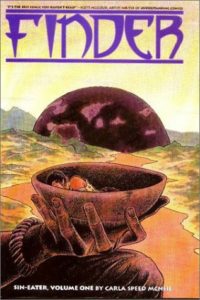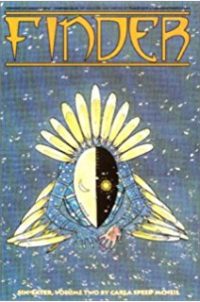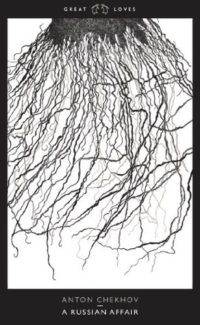Rainy weekend reads in brief
Last weekend we had lots of fun plans but we were feeling a little under the weather, so when it pretty much rained non-stop we took advantage and just stayed at home. For Tim that meant playing computer games (mostly Elite: Dangerous). For me it meant reading. I got through four and a half books. Which sounds like a lot for two days, but it includes two graphic novels and a very slim collection of short stories, so I think that reveals how much time we actually spent watching TV (mostly Legion, which is nightmarish but also excellent, and confusing). As reading lots in quick succession makes it harder to write in-depth reviews, I’ll do brief ones instead.
 Those Who Leave and Those Who Stay
Those Who Leave and Those Who Stay
by Elena Ferrante
translated from Italian by Ann Goldstein
This is the third of Ferrante’s Neapolitan novels, which began with My Brilliant Friend, and that means I now only have one instalment left to read in the saga of Elena and Lila. With recent(ish) revelations about the true identity of Ferrante (a nom de plume) it’s more tempting than ever to confuse her with narrator Elena, who begins this book as a successful author about to get married. Her childhood best friend Lila, meanwhile, is at a very low ebb, working her hands to shreds in a sausage factory owned by a rich friend of the Solara brothers, who have terrorised the neighbourhood since they were boys. As with every part of their story, Elena and Lila switch fortunes and switch from close, regular contact to spending long months apart.
The writing is, as ever, beautiful. I marked so many great quotes as I read. This book explores marriage, motherhood, family and whether or not anyone can, or should, escape their roots. Elena is torn between the cultured elegance of her new in-laws and the promise of a life far from Naples, and the importance of telling the truth and siding politically with the family and friends of her childhood. Lila is, as ever, fierce and demanding, making life decisions that Elena sometimes struggles to understand. I am looking forward to, and also sad already about, reading the final book in the series.
“How many who had been girls with us were no longer alive, had disappeared from the face of the earth because of illness, because their nervous systems had been unable to endure the sandpaper of torments, because their blood had been spilled…The old neighbourhood, unlike us, had remained the same. The low grey houses endured, the courtyard of our games, the dark mouths of the tunnel, and the violence. But the landscape around it had changed. The greenish stretch of the ponds was no longer there, the old canning factory had vanished. In their place was the gleam of glass skyscrapers, once signs of a radiant future that no-one had ever believed in.”
Storia di chi fugge e di chi resta published 2013 by Edizione E/O.
This translation published 2014 by Europa Editions.
Source: Waterstones.
 Finder, Vol.1: Sin-Eater, part 1
Finder, Vol.1: Sin-Eater, part 1
by Carla Speed-McNeil
It took me a while to figure out what on earth was happening in this book. I felt a little as if I had been dropped into the middle of a story and had to piece it together. In a way, that’s because Speed-McNeil is world-building here, setting up what became the long-running Finder series. But perhaps I should have looked up a plot summary or even just read the blurb first! This volume introduces Jaeger Ayers, an aboriginal man living in the city of Anvard, which is inside a bubble because most people could not survive long out on the Earth’s surface. The style is in some ways similar to Transmetropolitan – with lots of background detail, lots of politics, lots of species living together, lots of sexual variety and body modification – but in other ways it’s much the opposite, because this is a world where eating animals or failing to recycle are criminal acts.
Jaeger has a girlfriend, Emma, who is terrified of the day her husband gets released from prison. Jaeger is clearly fond of her whole family, even her over-amorous teenage daughter Rachel, but does he care enough to do the right thing by them? He’s not a straightforward hero. But then nothing in this book is straightforward. There are detailed endnotes in which Speed-McNeil expands on the plot and in particular the details of her world. Some of those details turn out to be key, which to me suggests a minor failure, because surely key details should have been in the comic panels. But the Finder series is beloved, so what do I know?
Originally published as single issues 1996–1999. This volume published 1999 by Lightspeed Press.
Source: Borrowed from a friend.
 Finder, Vol.2: Sin-Eater, part 2
Finder, Vol.2: Sin-Eater, part 2
by Carla Speed-McNeil
This volume completes Jaeger and Emma’s story. With the world established by the first book, this volume was able to build on some of the complex issues around the clans – family groups who look astonishingly alike one another. I didn’t get lost or confused nearly as much here. I’m not sure if that’s because there was a more linear narrative or because the world’s details are now set up. But I definitely enjoyed this more. And having settled into the story, I was better able to enjoy the excellent artwork.
I liked the odd details that Speed-McNeil introduces and some of the locations the story returns to, especially the Museum of Pain, where a giant statue promises information in return for your most painful memory – and it better really be the most painful, or the statue will know. Flashbacks fill in more of Jaeger’s history with Emma and her family, while a postscript short story offers a lighter-hearted moment in the future. I’m certainly intrigued about what’s next in the series but I’m not salivating for it.
Originally published as single issues 1999–2000. This volume published 2000 by Lightspeed Press.
Source: Borrowed from a friend.
 A Russian Affair
A Russian Affair
by Anton Chekhov
translated from Russian by Ronald Wilks
Well, I have now read Chekhov and I am pretty underwhelmed. He’s often spoken of as a master of the short story but I found these very staid. It reminded me of reading Jane Austen, but without the undercurrent of irony. (I know to many people that would sound like a compliment, but I’m not an Austen fan either.) These five short stories are all in theory about love, but for the most part they are about social expectations leading to missed opportunities, or frankly unpleasant young men deciding they can do better. This book is part of Penguin’s Great Loves series and I must admit I found it grossly miscategorised.
In “The house with the mezzanine”, the narrator is an artist who lives in the ballroom of an old manor house – a setting and description that seemed fantastically promising. But most of the story takes place at his neighbours’ house, where he slowly seduces the younger daughter of the family Zhenya, primarily because she is less serious than her sister Lida. He constantly mocks Lida for her attempts to help others in social projects. But he offers no real political critique, or better alternatives. He is simply a vapid lover of having good times. And he is a typical hero of these stories. I can’t say I’ll be rushing back to Chekhov any time soon.
First published in The Lady with the Little Dog and Other Stories, 1896–1904.
This selection published 2007 by Penguin Books.
Challenges: This counts towards the Classics Club.
It looks like this weekend is going to be equally wet, so maybe I’ll get through another four books. I doubt I’ll be doing any of those gardening tasks I’d set myself…